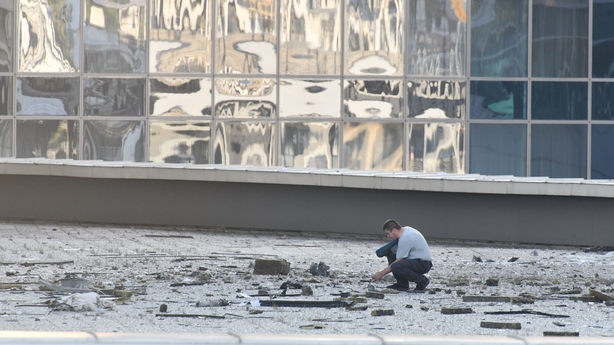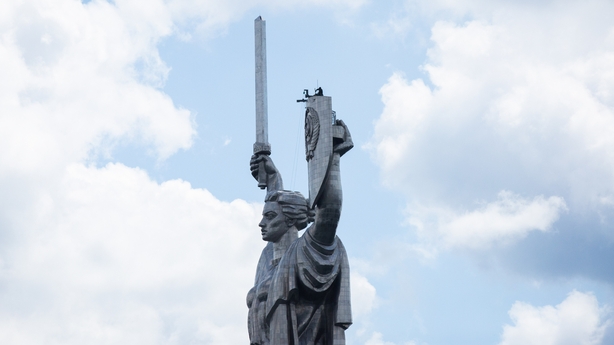A high-rise building in Moscow's business district that houses three Russian government ministries was struck by a drone for the second time in three days today, in what Russia called an attempted Ukrainian "terrorist attack".
A Ukrainian presidential adviser said Moscow should expect more drone attacks and "more war".
The building that was hit is known as the "IQ quarter", which houses the ministry of economic development, the digital ministry and the ministry of industry and trade.
Video obtained by Reuters showed a section of its glass facade, high above the ground, had been destroyed by the impact.

"At the moment, experts are assessing the damage and the state of the infrastructure for the safety of people in the building. This will take some time," Darya Levchenko, an adviser to the economy minister, said on Telegram. She said staff were working by video conference.
A drone was also downed over a district of Sevastopol, the city on the Crimean Peninsula that is home to the country's Black Sea naval fleet, according to the local governor.
"An explosion occurred on the ground (after it was downed), and grass and bushes caught fire," said governor Mikhail Razvozhaev.
Moscow has come under repeated drone attacks since early May, when two drones were fired at the roof of a building in the Kremlin complex.
While the incidents have not caused casualties or major damage, they have provoked widespread unease and sit awkwardly with the Kremlin's narrative that Russia's "special military operation" in Ukraine is proceeding according to plan.
"Indeed, a threat exists, it is obvious, but measures are being taken," Kremlin spokesman Dmitry Peskov told reporters, declining to comment further.
Ukraine has drawn satisfaction from the attacks, though without directly claiming responsibility for them.
"Moscow is rapidly getting used to a full-fledged war," Ukrainian presidential adviser Mykhailo Podolyak wrote on X, the social media platform previously known as Twitter.
He said Russia should expect "more unidentified drones, more collapse, more civil conflicts, more war".
Read more: What is going on with the Ukrainian counteroffensive?
In a statement, the Russian defence ministry said it had thwarted the "attempted terrorist attack" and downed two drones west of the Moscow city centre.
It said another one was foiled by jamming equipment and went "out of control" before crashing into buildings in the Moskva-Citi business district.
Moscow Mayor Sergei Sobyanin said the drone hit the same tower that had been struck on Sunday.
"The facade has been damaged on the 21st floor. Glazing was destroyed over 150 square metres," he said.
Vnukovo airport, one of three major airports serving the capital, briefly shut down but later resumed full operations.
There are signs that the incidents are causing disquiet among Russian businesses.
After the first drone hit Moskva-Citi on Sunday, tech company Yandex sent a memo to staff instructing them not to be in the office at night and urging them to "take care".
Ukraine says doctor killed in Russian shelling of Kherson hospital
Meanwhile in Ukraine, a doctor was killed and five medical workers were wounded in Russian shelling of a hospital in the southern city of Kherson today, regional officials said.
"The enemy launched another attack on the peaceful residents of our community," military administration head Roman Mrochko wrote on the Telegram messaging app.
Photos posted by officials showed the bloodied floor of a balcony and a gaping hole in a roof with debris strewn over the floor.
Regional governor Oleksandr Prokudin said four medical workers had been wounded in addition to a badly wounded nurse.
Mr Mrochko said the young doctor had only worked in his job for a few days and that doctors were fighting to save the life of the nurse. The surgery department of the facility was also damaged in the shelling, Mr Prokudin said.
Reuters could not immediately verify the details of the reports.
In a separate incident in the northeastern village of Pershotravneve, an elderly woman was killed and a man was wounded in Russian shelling around noon, Kharkiv regional governor Oleh Synehubov wrote on Telegram.
Ukraine removes hammer and sickle from giant Kyiv statue
Workers today lowered a hammer and sickle from a gigantic sculptural figure that watches over the Ukrainian capital, as part of a campaign to remove Soviet symbols which has ramped up since Moscow invaded last year.
The 62-metre-high steel figure of a woman holding a shield with the hammer and sickle and a sword, was opened in 1981 as a memorial to Soviet victory in World War II.

Standing on top of a war museum building, it is known in Ukrainian as Batkivshchyna Maty, literally "Fatherland Mother".
Ukraine's culture ministry has backed a plan to give the figure a new shield bearing the country's trident emblem.
Since last month, workers in a cradle suspended from a rail on top of the shield have been gradually cutting off grain and ribbon elements of the Soviet emblem and lowering them on ropes.
The whole shield will be replaced with a new one bearing the trident.
The statue is part of the National Museum of the History of Ukraine in the Second World War.
The museum director, Yuriy Savchuk, has called for the statue to be renamed Ukraine Mother.
A survey commissioned by the culture ministry last year found 85% of Ukrainians backed removing the hammer and sickle.
Since Russia's invasion, Ukraine has speeded up a process of removing references to Soviet history and Russian culture from geographical names and a law on decolonisation came into force this summer.
There are similar huge sculptural figures at Soviet-era war memorials in other cities, including Volgograd in Russia and Brest in Belarus.
